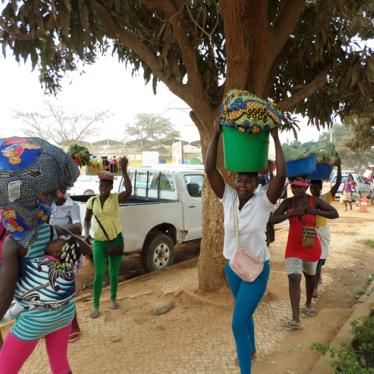(Johannesburg) – The African Commission on Human and Peoples’ Rights should focus attention on recent human rights violations in Angola and Sudan in its upcoming session, Human Rights Watch said today. The commission will meet in Luanda, Angola from April 28 to May 12, 2014.
The African Commission should condemn persistent human rights abuses in Angola, including the government’s failure to address restrictions on the media and peaceful assembly, unlawful killings, sexual violence and torture by security forces, and mass evictions. The commission should also establish a fact-finding mission to investigate the killing of at least 170 protesters in Sudan in September 2013, and the arbitrary detention, torture, and ill-treatment of hundreds of other people.
“Africa’s most important human rights institution should not ignore the appalling human rights record of its host, Angola,” said Daniel Bekele, Africa director at Human Rights Watch. “The African Commission should also take Sudan to task for its failure to bring to justice those responsible for the killing and torture of protesters last September.”
The African Commission is uniquely suited to press for change in these two particular situations. It is the main body mandated with promoting human and peoples’ rights on the continent. Under article 45 of the African Charter, the African Commission has the authority to conduct research into human rights practices and to give its views and recommendations to governments, as well as to cooperate with other African and international institutions concerned with the promotion and protection of human and peoples’ rights.
More than three decades of rule by President Jose Eduardo Dos Santos in Angola has resulted in his party having a monopoly on power. Angola has widespread corruption and serious human rights violations, with no accountability.
Freedom of expression is severely restricted due to government pressure on independent media, self-censorship, and government repression. The Angolan government has pursued numerous criminal defamation lawsuits against outspoken journalists and activists, and has arrested and beaten journalists trying to report on human rights violations by security forces. The commission should be alert to efforts by the Angolan government to restrict access for independent media and civil society to the African Commission – as has occurred in the past – including at a regional summit in 2011, Human Rights Watch said.
Since 2011, Angolan authorities have responded to peaceful anti-government protests organized by youth groups and others in Luanda and elsewhere with excessive force, arbitrary arrests, unfair trials, harassment, and intimidation of participants, journalists, and observers. Protest organizers and participants have also been targeted, including occasionally with violent attacks and abduction by security agents. In November 2013, a leaked confidential Interior Ministry report revealed that António Alves Kamulingue and Isaías Cassule, two protest organizers who were abducted and forcibly disappeared in May 2012, had been kidnapped, tortured, and killed by the police and domestic intelligence service.
“The African Commission should call for prosecutions of those responsible for killings, abductions, and torture in Angola,” Bekele said. “The commission should also urge the Angolan government to immediately repeal the criminal defamation laws as a start to ending repression of the media.”
The African Commission should also establish and send a fact-finding mission to Sudan to investigate the killings and injury of dozens of protesters last September, and the arbitrary detention of opposition party members, journalists, protesters, and activists. More than six months on, the Sudanese government has failed to credibly investigate, far less prosecute, the killings and related abuses, Human Rights Watch said.
The protests erupted in Wad Madani on September 23, 2013, in response to new economic austerity measures and price increases, and then spread to the capital, Khartoum, and other towns. Police and security forces responded to the protests with live ammunition and teargas, as well as assaults on participants and others with batons, to disperse the protests. As many as 170 people were killed.
Police and security services detained more than 800 people in various locations, according to Sudanese groups monitoring the events. Many were released within days, often following summary trials resulting in floggings or fines. But others were held for weeks or months without charge or access to family or lawyers.
Sudan’s National Security and Intelligence Service, with its sweeping powers of arrest and detention, has a long record of detaining government opponents and subjecting them to ill-treatment and torture. People who had been detained during the protests told Human Rights Watch that they had been beaten, verbally abused, deprived of sleep, and held for long periods in solitary confinement.
Human Rights Watch has documented the Sudanese government’s involvement in the unlawful killing and wounding of protesters as well as of bystanders caught up in protests, and that intelligence service officials were responsible for arbitrary detention, ill-treatment, and torture. Sudanese law enforcement officers continue to use excessive force to disperse protests, which, for example, led to the death of a Darfuri student in March 2014.
The Sudanese government has contested the casualty numbers and denied that security forces were responsible for the September violence. Although the interior and justice ministers each announced the creation of investigative committees, the only findings made public focus on damage allegedly caused by protesters, rather than the deaths or allegations of unlawful arrests and mistreatment.
“The African Commission should use its upcoming session to shine a spotlight on the ongoing abuses and repression in both Angola and Sudan,” Bekele said. “In the face of government indifference to their plight, victims of abuses in both countries have few places to turn.”







